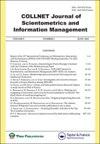预测相关
IF 0.8
Q2 INFORMATION SCIENCE & LIBRARY SCIENCE
COLLNET Journal of Scientometrics and Information Management
Pub Date : 2021-11-21
DOI:10.1080/09737766.2021.1989988
引用次数: 0
摘要
相关性在科学计量学研究中无处不在。例如,本工作说明了一个公式来量化复合指标和主要指标之间的预测相关性(即,复合指标可以表示为主要指标的加权和)。例如,总被引次数和自引次数或总发表次数和第一作者发表次数代表这样的变量对。然而,预测相关性在科学计量学中具有更广泛的潜在应用。结果表明,预测的相关性提供了一个有用的参考,允许对数据进行更结论性的解释。忽略概述的方法可能导致忽略数据中健壮的相关模式。这是通过一个小型模拟和两个基于先前工作的重新分析的插图来说明的。该方法可用于新的研究,以了解完整的相关模式。此外,概述的方法可用于回顾过去在期刊文章中报道的发现。本文章由计算机程序翻译,如有差异,请以英文原文为准。
Predicted correlation
Correlations are ubiquitous in scientometric research. The present work illustrates a formula to quantify the predicted correlation between a composite indicator and a primary indicator (i.e., the composite indicator can be expressed as a weighted sum of the primary indicator), for example. Total citations received and number of self-citations or total publications and number of first-authorship publications, for example, represent such variable pairs. However, predicted correlation has a far wider range of potential applications in scientometrics. It is demonstrated that the predicted correlation provides a useful reference that allows a more conclusive interpretation of the data. Ignoring the outlined approach can result in overlooking of robust correlational patterns in the data. This is illustrated by a small simulation and two illustrations based on re-analyses of previous work. The approach can be used in new studies to understand the complete correlational pattern. In addition, the outlined approach can be used to revisit past findings reported in journal articles.
求助全文
通过发布文献求助,成功后即可免费获取论文全文。
去求助
来源期刊

COLLNET Journal of Scientometrics and Information Management
INFORMATION SCIENCE & LIBRARY SCIENCE-
自引率
0.00%
发文量
11
 求助内容:
求助内容: 应助结果提醒方式:
应助结果提醒方式:


